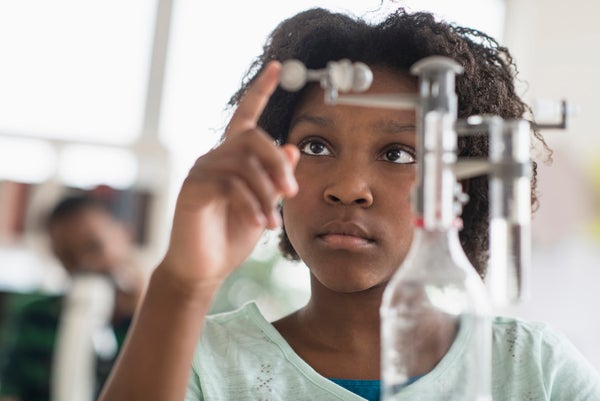The twin crises roiling society right now—the coronavirus pandemic and pervasive racism—are intertwined and reinforce one another. A way to address both is to nurture the talent for science and technology among underrepresented students across America.
Consider these two examples:
When David Lucero arrived at the University of Vermont from Queens, New York, in 2004, this first-generation college student had little direction. After a professor in an intro biology course engaged him in her research tracking Chagas disease, he became passionate about disease ecology, eventually earning a Ph.D. at the university. Today he is a much-published expert in disease transmission studying Zika, Legionnaires’ disease and COVID-19.
On supporting science journalism
If you're enjoying this article, consider supporting our award-winning journalism by subscribing. By purchasing a subscription you are helping to ensure the future of impactful stories about the discoveries and ideas shaping our world today.
Kizzmekia Corbett was a high school sophomore in rural North Carolina when she interned in a chemistry lab at the University of North Carolina, where the scientists she met ignited a lifelong passion for research. After earning an undergraduate degree at the University of Maryland, Baltimore County, and a Ph.D. from UNC, Corbett is today an NIH immunologist playing an important role in the government’s efforts to develop a coronavirus vaccine.
Lucero’s and Corbett’s experiences speak to a basic truth, that a talent for science, the capacity for hard work and the desire to make a contribution are found at every income level, among all ethnicities, races and genders, and in every area of the country. Often, all it takes is a spark—a role model, a mentor—to turn potential talent into a fulfilling life of scientific achievement.
If the coronavirus outbreak has taught us anything, it is that we can no longer afford to squander the talents of large segments of our population—a lesson reinforced by the strife the country is now experiencing and by the frustration forged by racism, ingrained prejudice and years of opportunity denied. To develop the vaccines, diagnostics, treatments and community-appropriate messaging that we’ll need for the next public health crisis, we need to harness every bright mind.
A new report, Vision 2030, from the National Science Board, makes clear that we are falling short.
The number of women and students from underrepresented groups in the nation’s science and engineering workforce has grown over the past decade. But because the workforce grew so rapidly overall during that time, the share of both women and minorities in the overall workforce declined.
To be representative of the U.S. population by the year 2030, much more rapid increases will be needed. Vision 2030 estimates that the number of women must nearly double, Black or African Americans must more than double, and Hispanic or Latinos must triple over the next 10 years.
If we are to meet the challenges ahead, it is urgent that we find and train these “missing millions,” in the National Science Board’s parlance. What can be done to accelerate the progress we’ve made and bring even more women and diverse students into the science and engineering workforce? Exposing young people to mentors and role models isn’t the only answer, but as the examples of Lucero and Corbett show, it can be a powerful tool.
I know the power of role models from my own experience. When I was growing up in a middle-class family in central India, my parents modeled hard work, demanded long hours of study from my siblings and me and instilled in us a love of learning. And teacher after passionate teacher throughout my school years demonstrated that by working hard, I could master complex material, grow as a person and lead a life dedicated to discovery. Later, I was able to serve as a mentor myself, tutoring economically disadvantaged kids while I was in college in India and as part of an NIH-supported program that brought minority students from area schools to university science and engineering laboratories in Milwaukee.
Unfortunately, mentors and role models don’t appear magically. To have an impact at scale, mentoring initiatives require intentionality and financing.
That is why it is so important that we formally recognize and significantly increase support for mentoring programs across the board. Congress recently introduced a bipartisan bill called the Endless Frontier Act that would greatly increase funding for the National Science Foundation, including for education. That is a bold step in the right direction, given that the minority-oriented mentoring programs the foundation sponsors—such as initiatives within NSF INCLUDES—could be substantially bolstered. Universities also have a part to play by expanding promotion and tenure guidelines to include documentation of mentorship efforts. And the business community must be far more intentional in creating internships that offer mentorship to underserved populations.
Every young person in America deserves to have the kind of mentoring experience that so dramatically altered the paths of Lucero and Corbett. In the next pandemic, our lives may depend on it.
